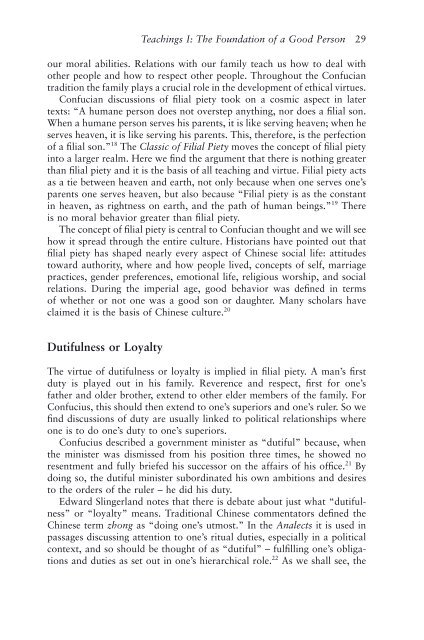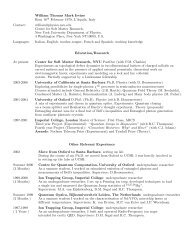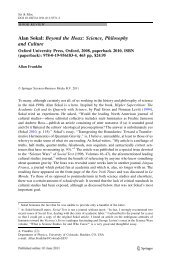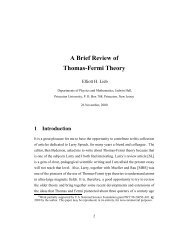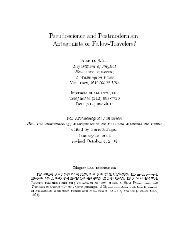Good Confucianism book (pdf) - Department of Physics
Good Confucianism book (pdf) - Department of Physics
Good Confucianism book (pdf) - Department of Physics
You also want an ePaper? Increase the reach of your titles
YUMPU automatically turns print PDFs into web optimized ePapers that Google loves.
Teachings I: The Foundation <strong>of</strong> a <strong>Good</strong> Person 29our moral abilities. Relations with our family teach us how to deal withother people and how to respect other people. Throughout the Confuciantradition the family plays a crucial role in the development <strong>of</strong> ethical virtues.Confucian discussions <strong>of</strong> filial piety took on a cosmic aspect in latertexts: “ A humane person does not overstep anything, nor does a filial son.When a humane person serves his parents, it is like serving heaven; when heserves heaven, it is like serving his parents. This, therefore, is the perfection<strong>of</strong> a filial son. ” 18 The Classic <strong>of</strong> Filial Piety moves the concept <strong>of</strong> filial pietyinto a larger realm. Here we find the argument that there is nothing greaterthan filial piety and it is the basis <strong>of</strong> all teaching and virtue. Filial piety actsas a tie between heaven and earth, not only because when one serves one ’ sparents one serves heaven, but also because “ Filial piety is as the constantin heaven, as rightness on earth, and the path <strong>of</strong> human beings. ” 19 Thereis no moral behavior greater than filial piety.The concept <strong>of</strong> filial piety is central to Confucian thought and we will seehow it spread through the entire culture. Historians have pointed out thatfilial piety has shaped nearly every aspect <strong>of</strong> Chinese social life: attitudestoward authority, where and how people lived, concepts <strong>of</strong> self, marriagepractices, gender preferences, emotional life, religious worship, and socialrelations. During the imperial age, good behavior was defined in terms<strong>of</strong> whether or not one was a good son or daughter. Many scholars haveclaimed it is the basis <strong>of</strong> Chinese culture. 20Dutifulness or LoyaltyThe virtue <strong>of</strong> dutifulness or loyalty is implied in filial piety. A man ’ s firstduty is played out in his family. Reverence and respect, first for one ’ sfather and older brother, extend to other elder members <strong>of</strong> the family. ForConfucius, this should then extend to one ’ s superiors and one ’ s ruler. So wefind discussions <strong>of</strong> duty are usually linked to political relationships whereone is to do one ’ s duty to one ’ s superiors.Confucius described a government minister as “ dutiful ” because, whenthe minister was dismissed from his position three times, he showed noresentment and fully briefed his successor on the affairs <strong>of</strong> his <strong>of</strong>fice. 21 Bydoing so, the dutiful minister subordinated his own ambitions and desiresto the orders <strong>of</strong> the ruler – he did his duty.Edward Slingerland notes that there is debate about just what “ dutifulness” or “ loyalty ” means. Traditional Chinese commentators defined theChinese term zhong as “ doing one ’ s utmost. ” In the Analects it is used inpassages discussing attention to one ’ s ritual duties, especially in a politicalcontext, and so should be thought <strong>of</strong> as “ dutiful ” – fulfilling one ’ s obligationsand duties as set out in one ’ s hierarchical role. 22 As we shall see, the


